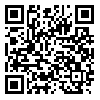Volume 35, Issue 140 (March 2023)
IJN 2023, 35(140): 584-597 |
Back to browse issues page
Download citation:
BibTeX | RIS | EndNote | Medlars | ProCite | Reference Manager | RefWorks
Send citation to:



BibTeX | RIS | EndNote | Medlars | ProCite | Reference Manager | RefWorks
Send citation to:
Sharifian P, Shademan N, Kuchaki Z. Predicting Nurses’ Burnout Based on Personality Traits, Work-family Conflict and Social Support in the COVID-19 Epidemic. IJN 2023; 35 (140) :584-597
URL: http://ijn.iums.ac.ir/article-1-3557-en.html
URL: http://ijn.iums.ac.ir/article-1-3557-en.html
1- Pediatric and Neonatal Intensive Care Nursing Department, School of Nursing and Midwifery, Iran University of Medicalscirnces, Tehran, Iran.
2- Department of Psychology, Science and Research Branch, Islamic Azad University, Tehran, Iran.
3- Department of Nursing, Faculty of Nursing and Midwifery, Ilam University of Medical Sciences, Ilam, Iran. ,z.kuchaki61@yahoo.com
2- Department of Psychology, Science and Research Branch, Islamic Azad University, Tehran, Iran.
3- Department of Nursing, Faculty of Nursing and Midwifery, Ilam University of Medical Sciences, Ilam, Iran. ,
Abstract: (3346 Views)
Background & Aims Considering the prevalence of COVID-19, the sensitivity of the nursing profession, and the harmful effects of job burnout on the quality of nursing care, the present study aims to investigate the role of personality traits, work-family conflicts, and social support in predicting job burnout of nurses during the COVID-19 pandemic.
Materials & Methods This descriptive-analytical study with a cross-sectional design was conducted from August to September 2021, coinciding with the fifth wave of COVID-19 in Iran, on 130 nurses working in four hospitals in Ilam province, who were selected by a random sampling method. Data collection tools were a demographic form, Maslach burnout questionnaire, NEO personality inventory, Carlson's work-family conflict scale, and Zimet's multidimensional scale of perceived social support. The collected data were analyzed in SPSS software, version 26 using Pearson's correlation test and regression analysis. The significant level was set at 0.05.
Results According to the results of regression analysis, the relationship of work-family conflict with job burnout was negative and significant (P<0.05). The extroversion had the highest effect on emotional exhaustion (β=-0.351). Perceived social support had no significant effect on job burnout (P>0.05). Agreeableness had the highest effect on depersonalization (β=0.405). The work-family conflict had the highest effect on personal accomplishment (β=0.260).
Conclusion Personality traits, work-family conflicts, and social support can predict the occurrence of job burnout in nurses. It is necessary for the hospital authorities to use supportive and educational measures to reduce job burnout in nurses during the pandemic.
Materials & Methods This descriptive-analytical study with a cross-sectional design was conducted from August to September 2021, coinciding with the fifth wave of COVID-19 in Iran, on 130 nurses working in four hospitals in Ilam province, who were selected by a random sampling method. Data collection tools were a demographic form, Maslach burnout questionnaire, NEO personality inventory, Carlson's work-family conflict scale, and Zimet's multidimensional scale of perceived social support. The collected data were analyzed in SPSS software, version 26 using Pearson's correlation test and regression analysis. The significant level was set at 0.05.
Results According to the results of regression analysis, the relationship of work-family conflict with job burnout was negative and significant (P<0.05). The extroversion had the highest effect on emotional exhaustion (β=-0.351). Perceived social support had no significant effect on job burnout (P>0.05). Agreeableness had the highest effect on depersonalization (β=0.405). The work-family conflict had the highest effect on personal accomplishment (β=0.260).
Conclusion Personality traits, work-family conflicts, and social support can predict the occurrence of job burnout in nurses. It is necessary for the hospital authorities to use supportive and educational measures to reduce job burnout in nurses during the pandemic.
Keywords: Job burnout, Personality traits, Work-family conflict, Perceived social support, Nurses, COVID-19
Type of Study: Research |
Subject:
nursing
Received: 2022/03/17 | Accepted: 2023/02/20 | Published: 2023/03/1
Received: 2022/03/17 | Accepted: 2023/02/20 | Published: 2023/03/1
Send email to the article author
| Rights and permissions | |
 |
This work is licensed under a Creative Commons Attribution-NonCommercial 4.0 International License. |







